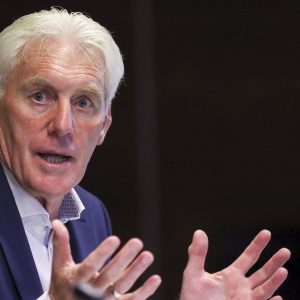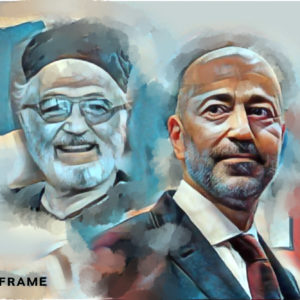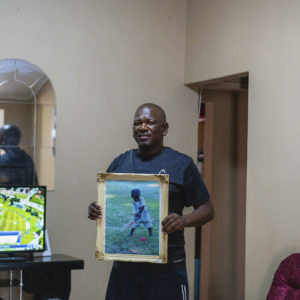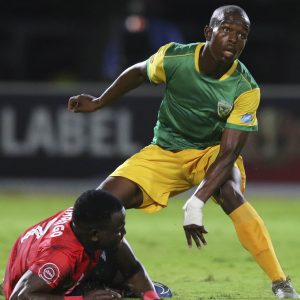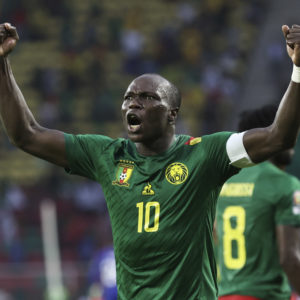The shaping of Bongokuhle Hlongwane
The 21-year-old’s talent was raw but through careful training and encouragement at Maritzburg United, he is a star in the making. And now he is off to the United States.
Author:
5 February 2022
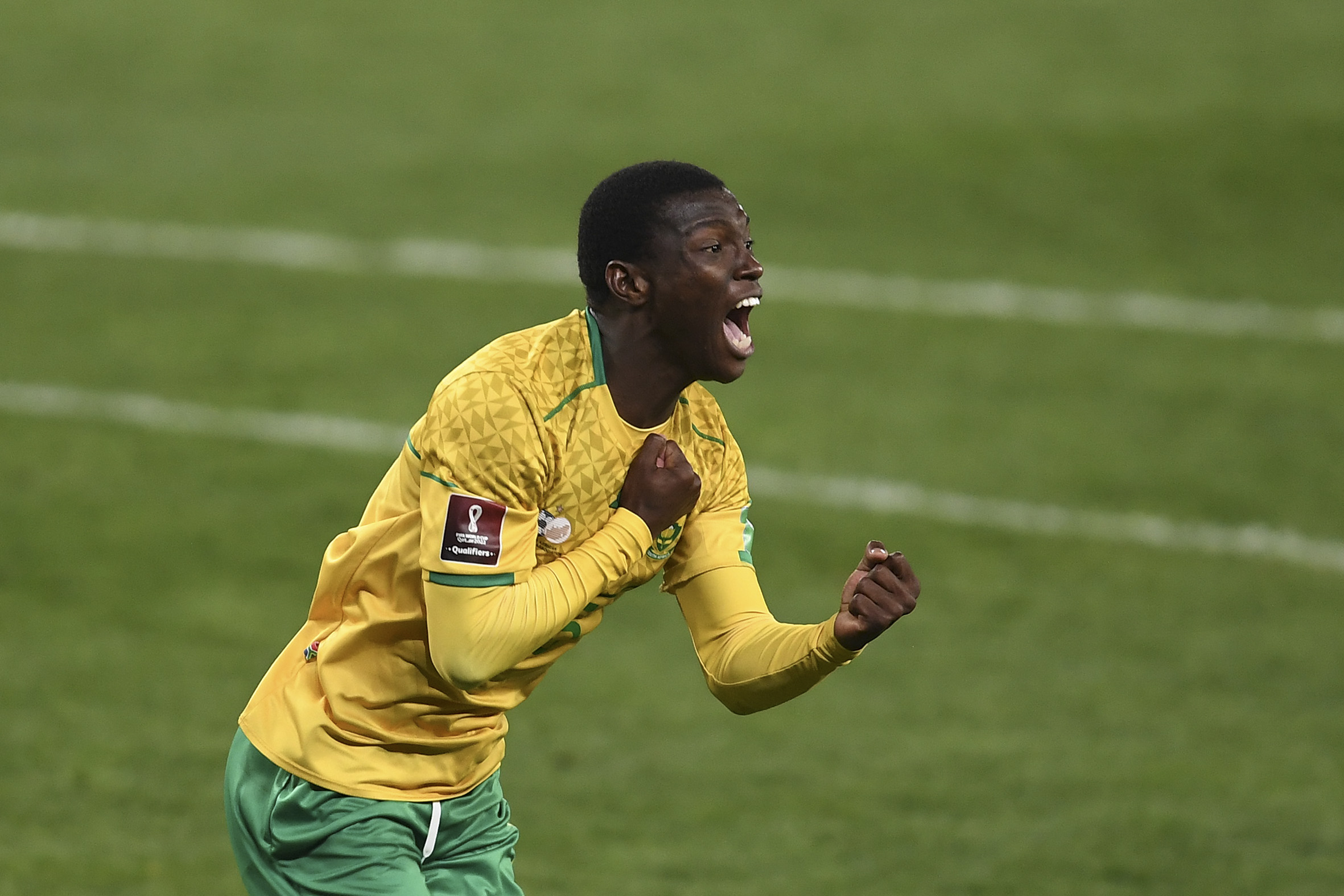
They breed their young men tough in KwaNxamalala, in the shadow of Swartkop Mountain, a peak that overlooks Pietermaritzburg. Bafana Bafana star Bongokuhle Hlongwane’s qualities of speed, tenacity in chasing everything down, toughness in challenges and a burning hunger for success were forged in humble beginnings in that sometimes troubled shadow.
These are talents he will now deploy in the United States, after his January transfer from Maritzburg United to Major League Soccer (MLS) outfit Minnesota United. The striking prodigy’s progression has been quick. At 13, Hlongwane (or Saniza to his teammates and coaches) played with men for fourth-tier South African Breweries (SAB) League side Nxamalala Fast XI. By 17, his terrier-like approach saw him recruited to Maritzburg’s Under-19 SAB League team, Maritzburg United Colts.
He was promoted to their DStv Diski Challenge (DDC) team less than two months later. Within seven months, in April 2019, then-United coach Eric Tinkler handed him his Premier Soccer League debut in a 1-0 defeat to Orlando Pirates at Harry Gwala Stadium. He was 18 years, 10 months and four days old.
Hlongwane made his national team debut in July 2019 as a substitute when the Under-23 coach David Notoane took charge of a second string Bafana team that lost 3-2 to Lesotho in the African Nations Championship qualifiers. A low scoring ratio (he had six goals in 53 league games before he left Maritzburg) and his age would have scared off many national team coaches from selecting him for high-profile matches. But not Hugo Broos.
Related article:
The Belgian’s arrival in mid-2021 with a youth policy aimed at shaking South Africa out of years of underachievement saw Hlongwane get a call-up to the friendly against Uganda where Broos was at home for his vaccine jab, and six squad members were sidelined by Covid-19. He starred for South Africa in their 3-2 victory against Uganda in a friendly match played at FNB Stadium in June 2021. Assistant coach Helman Mkhalele started Hlongwane, mystified at the time as to why he had not been included in Notoane’s squad travelling to the Tokyo Olympics, and he scored a gem along with debutant substitute Evidence Makgopa’s brace in a 3-2 win.
The energetic strike partnership of Hlongwane (five starts, one substitution) and his 21-year-old age-mate Makgopa (four starts, one substitution ) was influential in Bafana Bafana running Ghana close in their 2022 World Cup qualifying group, bowing out on fewer goals scored.
Those are the bones of Hlongwane’s story. To fill in the flesh, you go back to KwaNxamalala, where the teen attracted the interest of Premiership clubs raising hell for Fast XI.
Tough roots
The sprawling township of Edenvale and its satellites in the west of Pietermaritzburg, Sweetwaters and KwaNxamalala, were an epicentre of the political violence that swept KwaZulu-Natal in the 1980s and 1990s. That was before Hlongwane was born. But the trauma, tensions and flare-ups of violence remain. Pietermaritzburg was at the centre of the looting that followed the arrest of former president Jacob Zuma in July. KwaNxamalala is a tough place in which to grow up.
“He was a prodigy who made an impression. He would always score against us,” says Peter Petersen, the former Maritzburg United rightback who was coach of the Colts side that Hlongwane was drafted into after catching the eye in Fast XI matches against them.
“He’s got the desire, pace and raw speed. A defender might think he can kick him, but it’s like a red rag to a bull [because] Saniza just goes back harder. I saw his dad, a well-known footballer in KwaNxamalala, play in a local tournament. He’s an athlete – you could see where Saniza gets his physique from. You have to go to KwaNxamalala to understand the place. It’s a close community at a bit [higher] altitude above Pietermaritzburg. Up there, in life, it’s either you go up or you go down. They raise tough guys and it’s never easy to play there.”
Related article:
Perhaps Hlongwane’s rawness, evident in his scoring troubles for United in the 2021-22 season (two goals in 16 games), is partly because he was coached by fellow pupils at his primary school and Umthoqotho High School where, he says, “the teachers didn’t understand football”.
He spent nine months in an organised youth programme before playing Premiership football. One wonders if, for example, a well-prepared SuperSport United academy product would have battled as much with the mental rigours of the spotlight. Hlongwane’s undoubted ability comes from growing up with a ball at his feet.
“My grandfather had a team called Codesa FC. At 13, I was playing for the team my father was in, Nxamalala Fast XI,” Hlongwane says. “There were maybe two games we played together, then he said he was leaving football because I was there to replace him. I grew up watching him taking local Player of the Tournament awards. I was motivated by him.”
Hlongwane’s parents, who were not married, separated when he was 11. He lived with his mother until he was 13. Then, with his younger sister, he moved in with his father Wiseman Hlongwane, a construction worker, “because he has his own house”.
Related article:
Towards the end of his four years at Fast XI, Hlongwane played for six months under former Bafana, Mamelodi Sundowns and Maritzburg United striker Sandile “AK-47” Ndlovu at Phenduka FC in the third-tier Motsepe League. “He had an influence on my career [because] he played at the top level,” the striker said. And it was Ndlovu who advised him to choose United over AmaZulu, who also had made an offer.
The recounting of Hlongwane’s story must include a word about Maritzburg United’s increasingly effective youth structure. It has been bolstered in the past five years by the efforts of current head coach Ernst Middendorp, former head coach Fadlu Davids and current assistant coach Maahier Davids. The club has long had ambitions to sell players abroad instead of selling them to bigger local clubs. Hlongwane’s transfer to Minnesota is the first fulfillment of this ambition.
“Yes, the club gets criticism for being a selling team. On the flip side, guys like Saniza, [Lebohang] Maboe, [Fortune] Makaringe and [Bandile] Shandu were given those opportunities young because this is a team that wants to develop and sell talent,” says Petersen, who now heads United’s development.
‘Saniza liked to roam’
Minnesota United coach Adrian Heath said the MLS side are excited about Hlongwane’s football intelligence. His positioning is good for a young player. “Yes, but it wasn’t always easy,” Petersen says. “Playing under Maahier and especially Ernst can be difficult with the finer details.
“Saniza liked to roam. After years of building an understanding, if given a role now he will do it. But there were lots of fights – it was even a bit ugly. He was really struggling just before Ernst arrived back at the club, and Ernst came in and rattled him a bit and sent him back to the DDC in about December 2020.
“If Ernst didn’t pick that up, we might have lost Saniza to wrong things. Saniza worked so hard [that] within less than a month he was back in the first team. And look where he is today.”
Related article:
Hlongwane’s goals for the national team were class. Against Uganda he took a pass at the right touchline, dribbled inside teasing the opposition left back, and finished low inside the left upright. In the World Cup-qualifying game against Ghana, in which Bafana Bafana won 1-0, his instinctive left-footed finish was so deft that even television replays struggled to pick it up clearly. A thunderous drive onto the crossbar against Zimbabwe showed the player has a right boot on him.
While starring for South Africa, Hlongwane lost concentration and confidence in front of goal for Maritzburg United. “I think it was [a] bit much for him in the last few months – [being] in the national team, in the spotlight,” Petersen says.
“He was stuck in a zone between the national team and coming back and being Saniza at Maritzburg. I think, even if he hadn’t moved to the US, with his commitment level he would have come through that.
“He used to give me headaches. When he eventually broke into the DDC and PSL he would play for the DDC on a Saturday, as the game finished he’d come and say, ‘Coach can I play for the SAB tomorrow?’ That desire will take him places.”
Related article:
Davids raves about Hlongwane’s versatility: “He can shoot from all angles – right foot, left foot, close and far out. When a young player bursts onto the scene everybody takes note, teams analyse them. Also, United have struggled this season, and perhaps we didn’t give him the supply. He can score.”
The move to the United States might be ideal. In Europe, even young strikers are expected to score. Hlongwane’s raw skills and speed are assets Minnesota United are eager to unleash, and he will receive polishing in the slickly organised MLS under less pressure.
“He can also speak English there, compared to Belgium or Portugal, where someone from humble beginnings can have such a culture shock,” Davids says. “It’s a big step but not too big. It feels right.”

